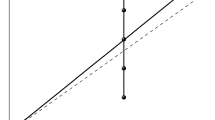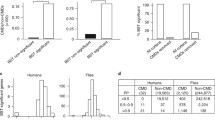Summary
A mathematical formula for the relationship between the average number of nucleotide substitutions per site and the proportion of shared restriction sites between two homologous nucleons is developed by taking into account the unequal rates of substitution among different pairs of nucleotides. Using this formula, the possible amount of bias of the estimate of the number of nucleotide substitutions obtained by the Upholt-Nei-Li formula for restriction site data is investigated. The results obtained indicate that the bias depends upon the nucleotides in the recognition sequence of the restriction enzyme used, the unequal rates of substitution among different nucleotides, and the unequal nucleotide frequencies, but the primary factor is the unequal rates of nucleotide substitution. The amount of bias is generally larger for four-base enzymes than for six-base enzymes. However, when many restriction enzymes are used for the study of DNA divergence, the bias is unlikely to be very large unless the rate of substitution greatly varies from nucleotide to nucleotide.
Similar content being viewed by others
References
Aoki K, Tateno Y, Takahata N (1981) J Mol Evol 18:1–8
Brown WM (1981) Ann N Y Acad Sci 361:119–134
Brown WM, George M Jr, Wilson AC (1979) Proc Natl Acad Sci USA 76:1967–1971
Li W-H (1981) J Mol Evol 17:251–255
Nei M, Li W-H (1979) Proc Natl Acad Sci USA 76:5269–5273
Nei M, Tajima F (1981) Genetics 97:145–163
Upholt WB (1977) Nucleic Acids Res 4:1257–1265
Wright S (1969) Evolution and the Genetics of Populations. Vol 2. Univ. of Chicago Press, Chicago
Author information
Authors and Affiliations
Rights and permissions
About this article
Cite this article
Tajima, F., Nei, M. Biases of the estimates of DNA divergence obtained by the restriction enzyme technique. J Mol Evol 18, 115–120 (1982). https://doi.org/10.1007/BF01810830
Received:
Accepted:
Issue Date:
DOI: https://doi.org/10.1007/BF01810830




